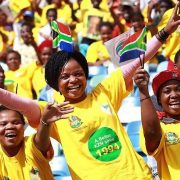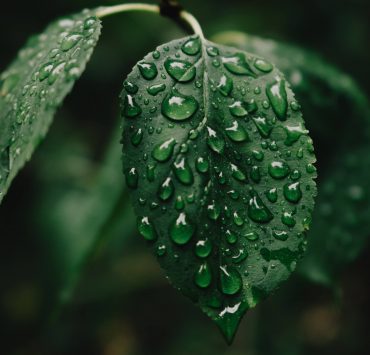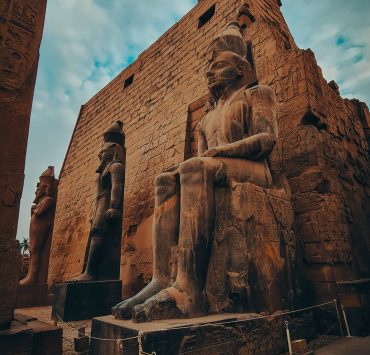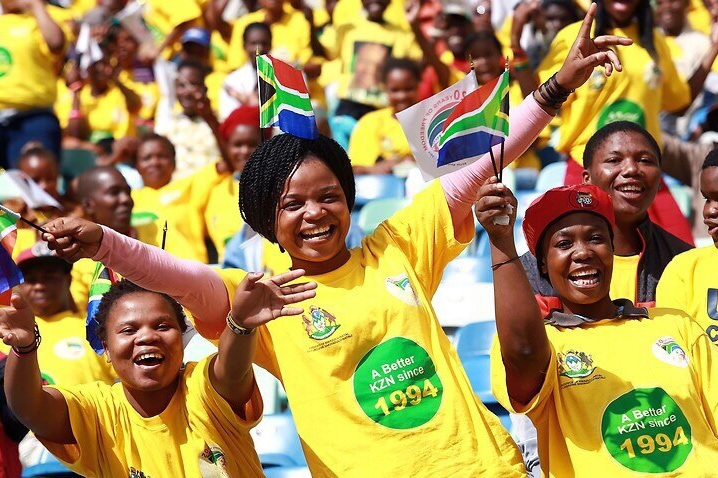Interview: Chris Ndayiragije
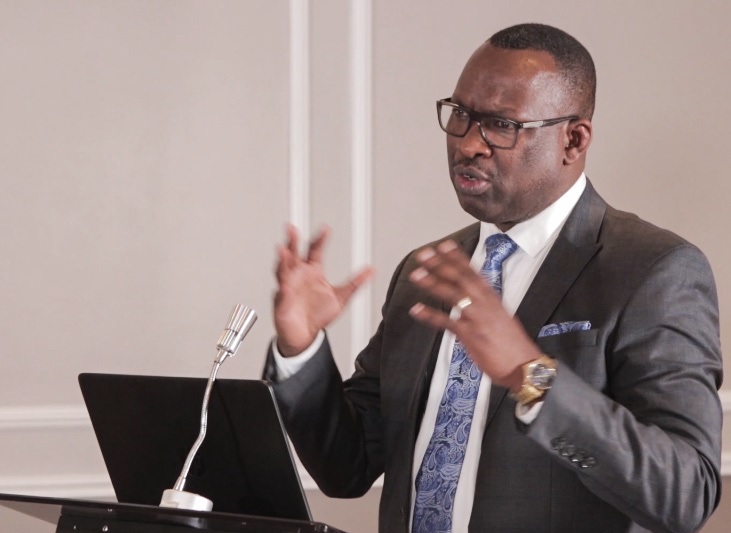
Passionate about getting God's message concerning Afrika and the end…
Funding Development in Afrika
Please tell us about your book.
This book is an urgent call to all 55 countries, especially our leaders, for these 7 points we want to ask them to implement. The first and the most important call is the creation of continental taxes for all the goods and services that are exchanged between every Afrikan country. The private sector will be going there to collect these continental taxes.
The second point will be to create our own IMF and World Bank, we are capable of doing that.
The third point will be to build two infrastructures which are under Agenda 2063: an integrated high-speed railway – to complete it – and the Grand Inga Dam. To be able to have one common market, to electrify all our capital and commercial cities and to be able to link all our capital cities with a fast railway. These two projects are the main projects under Agenda 2063, they are lacking finances and they are able to change the whole of Afrika for good.
The fourth point is we have got the Africa Standby Force, which must be ready, it must be strengthened to the level that it is capable of going to every Afrikan country to stop any terrorist and stop any coup d’état. And we are able to do that ourselves.
Point number five is to prepare a new constitution for the Pan-African Parliament which should be done in terms of languages. We have got 2200 languages. As you know with Agenda 2063, which is in the process of being implemented by 2063, we will be able to be united as one continent, one country; we have to base our unity in terms of languages instead of countries. We know languages are crossing borders it will help us to unite by respecting our diversity.
Number six is to dissolve all the subregions. We know that we have got almost 39 sub-regions such as ECOWAS, EAC, SADC. Only Afrika has got a lot of subregions where one country, for example, Kenya belongs to 10 of them, Burundi belongs to 11 of them. And all of them are seeking markets but behind are also seeking projects that are financed by the west. Once we look at the continental scope and just support the African trade agreement secretariat which is in Ghana, we will be able to move much faster.
The last one is the point about industrialization. Afrika is capable of industrializing itself in 10-20 years but they have to now look at the debt and government itself to initiate finances the way they initiate finances for roads and infrastructure. They go and open industrial areas, import machinery that is cheap and then sell those industries when they reach the growth phase, usually it’s 2-4 years. They sell to the private sector. They don’t keep them. They look at the product they usually import not at the strategic sectors only, even on the normal products like shoes or computers. They open those industries and sell to private sectors; private sectors like to buy companies that are already operational.
The last one is to call to all Pan-Afrikanists to stop talking about the past. Speaking about the past is not necessary. We spoke about European Union; we know enough about that. Now Russians are coming, Indians are coming, Pakistanis are coming because they see the emptiness for us not to do anything, which is really threatening us. The only solution for Afrika is Afrika’s financial independence from the west, from IMF, World Bank, Exim Bank and ICBN bank from China.
Once we create that institution, we will be able to deal with the problems that we have.
Our population is going to triple. We’re moving from 1.3 billion people to 2.8 billion people by 2060 to 4 billion people by 2100 if we don’t do something now, we make together our 54 markets with this integrated high-speed railway, we electrify our continent, we are not going to get industrialization in our continent, we are just going to eat each other. I am sorry to use this strong word. It is so urgent that we act now and no one is going to act for us.
We have seen with this Covid 19 how they didn’t even help us with this vaccine. So, we have to enter into globalization with full force with our own finances and we are capable to create an institution that can become like IMF and World Bank. When you look at all those statistics out there, we are capable of doing that with continental tax which we can establish with other Afrikan countries.
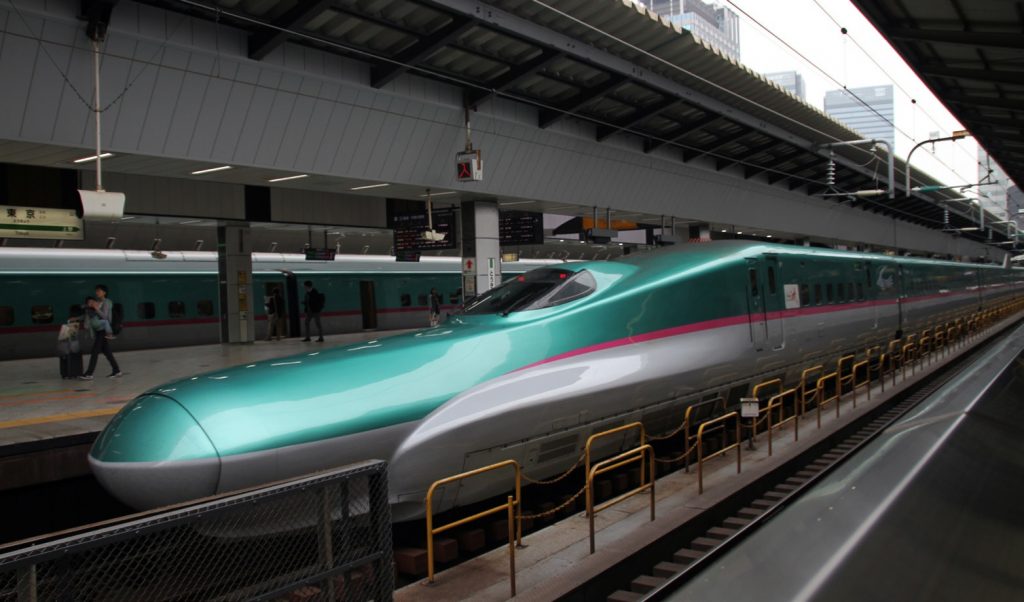
Concerning introducing a continental tax as a plan for rising out of poverty, for instance, in a country like Kenya where accountability of public bodies has been very low and it has been embarrassing and even painful to the people. Is there going to be a possibility of us giving money to one central place as Afrikans, and trusting that the money is not going to be stolen and that it is going to be put to good use?
That question is often raised when I try to explain these continental taxes. These 55 countries under African Union will sit down and create what I call Pan-African Infrastructure Fund which is kind of a tax union. This institution will be given enough rights to sit with each Afrikan country. The tax base in Afrika is too narrow, we must know that our economy is almost 50% informal sector. They will help these countries improve on taxation by rebasing their economies. Rebasing economies is about trying to get statistics on each Afrikan country. In Nigeria in 2015 they did statistics. They thought they had a 270billion dollar GDP but they discovered it was 510billion dollars. This has helped them increase taxation. The same with Kenya, I think it was in 2010 they did that they and became lower middle income; they found they grew 20%. Because we depend on statistics for the last 30years, this helps to increase taxation onto places and then create new taxpayers. This is important. This institution will go there as a separate entity to separate local taxes from continental taxes.
Is it feasible? Yes, it is feasible because remember between 1970 and 1994 Nigeria created what was called ‘Mandela Tax’ which was collecting 2% from every government worker’s salary and they managed to collect 61billion dollars for 20 years to help Southern Afrika to come out of apartheid. This happened by themselves. They sat together as a government with Obasanjo and said they have to collect this money to liberate Southern Afrika. They managed to get 61billion dollars where their economy was almost 50 billion dollars in the 1990s now their GDP is 600bn dollars. When you look at the GDPs of Afrikan countries, 55 of them, they have grown almost tenfold in the past 20 years and Europe did grow only twofold, and we are capable of having these finances. We are capable of having these finances.
When we talk about accountability, corruption and so on, the private sector will go collect on behalf of the African Union. Even if we collect 70% of what we are supposed to collect, we will succeed. Corruption cannot make us not do that. From 1960 to 2022 that’s when we started to collect taxes when the colonizers went, we did grow. In many countries, there were dictators who used to take the whole budget home, it is not the case now. Governments in Afrika manage to collect taxes efficiently only it should be more in the informal sector, enlarge the tax base and use more technology to collect more money as it is supposed to.
We have to know the tax in Afrika is three times lower than in Europe. Income tax in Kenya is 30%, in Nigeria income tax is 24% and when you look for example most of the European countries for the past decade are at 45%, 50%, some of the countries are at 65% on personal income. That started in 1916 when there was World War I and World War II they increased because they wanted to create infrastructure, railways to be able to supply their industries with goods that would increase their economies and enable them to fight; after that, they did it to control other countries. As European taxpayers suffer to control Afrika it is time for Afrikans to suffer to protect and develop Afrika. Afrika has developed enough countries, now it is time to develop our continent through continental taxes. We are capable of doing that and I am sure that if it is explained to Afrikans what it is all about: to create our own IMF and World Bank, they will easily do that and really support our continent to be able to do that and achieve the goals that they are able to achieve.
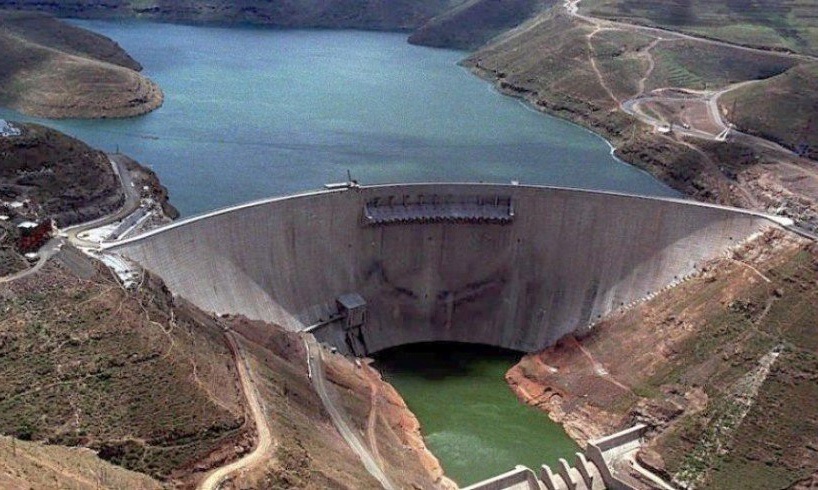
If they are able to prove that they are actually doing something with the money maybe, it’s something they can grow towards. Right now, the tax regimes seem to be used more as a tool for the oppression of the people and exploitation. Is it possible to convince 55 nations who have not even vigorously implemented the continental free trade area agreement, to shelve their national aspirations and come together to build a continental dream and vision; infrastructure and so on and so forth? Meaning that they are actually accepting that resources are going to be diverted from national interests towards a continental good. Do you think that is actually realistic? That they will willingly set aside their ambitions?
I think they will accept. Let me give you the example of Uganda, when they produce bananas, they don’t get where to export their bananas, Burundi this time they produce a lot of beans or mangoes they don’t get the market and those things are thrown away. Why? It’s not because they can’t take it into Tanzania or Kenya and so on, it’s because there’s a lack of this infrastructure. Remember, Afrika is huge it is almost 30-million-kilometer squares and we have got 1.3 billion people within those kilometers square. You must remember that United States of America’s surface area you add it to India, you add it to China, you add it to European Union, you add it to Argentina, these five countries have got an equal surface area of Afrika but then they have got 3.6 billion people, us we have got 1.3, Afrika is empty.
For Afrikans to exchange goods they have one small market, it is very important that they be able to have this integrated high-speed railway that is fast enough for every good to be exchanged at every corner of Afrika. They will accept because of their comparative advantage. If you have flowers in Kenya, you have got bananas in Uganda, you have got beans in Burundi, you have got potatoes in Rwanda, obviously you want the market. You want this to reach Gabon in less than one hour, you want this to reach Ethiopia in less than one day, you want this to reach South Afrika in less than two days but now it takes weeks.
Even this trade agreement that we signed cannot be successful without this integrated high-speed railway looking at the size of this continent. It is the same as having Congo DRC, their provinces are far enough from each other and they don’t share their goods with each other, there is no barrier there. They don’t share these goods because there is a lack of infrastructure. We are happy that we have got this trade agreement but it will fail and this Agenda 2063 will fail because of a lack of finances. It’s a question of time and we’re in trouble we just have to act because we will be having 3 billion people in the next 30 years ahead so we don’t have a choice here, it’s an emergency. That’s why our organization is calling all Pan-Afrikanists and Afrikan people that every African Union General Assembly we go there and impose this idea of creating our own finances and then we will be able to create these continental infrastructures and electrify our capital cities as early as possible.
It is not that we just want to develop; it is a problem at our door we have to act and no one will help us we have seen it with Covid 19, the way they collected money for their own for Covid 19 we must do it ourselves we must collect our money. We have enough money to have IMF and World Bank assets combined ourselves. We are able to create a trillion dollars within a decade after we have built these infrastructures with continental taxes.
I agree that the resources that Afrika needs are actually in the hands of Afrikans or in the land of Afrika and I do know that we have much more than we are saying. As you have described it, we have enough capacity to feed ourselves, to look after ourselves, if we actually focus on ourselves. I am still uncomfortable with the idea of a tax, maybe we don’t call it a tax and maybe we don’t look at it as a tax but we look at it the way Afrikan communities would do it, it is a pool of resources, a communal fund for Afrika’s growth, an Afrika growth fund that people would contribute to voluntarily. But there would have to be a lot of transparency around how it is collected and how it is being spent. How do you manage the issue of transparency, who do you envision managing such a fund and rolling it out?
As I said, 55 countries will sit together and create the Pan-African Infrastructure Fund. It must be an organization that has enough power to go out there and create continental taxes; they will work with the private sector. There is enough private sector out there internationally, you just show them go and collect this money they will collect this money on our behalf. They might not collect 100% they will collect for sure 80%, we will succeed to get 80% at least. These other things are technical aspects. We have first to agree on a philosophical aspect: do we need this fund? That’s the first point, then we go to the aspect of how we can collect this money efficiently the only way is for the private sector to collect that money on our behalf.
Why do you believe so strongly in them?
Because they do that in many countries and it’s easy to do that. And I think we have no choice first, secondly, the fact that people don’t like taxes we can call it a contribution, but we must remember out there, there is something called Assessed Contribution, countries that should contribute to the African Union, 50% of them every year are not paying. Let’s start and that question will be on the process to study and deal with that. To say, no let’s not do it because there will be corruption, we usually collect taxes even if there is corruption. Also, Afrikan people, I am sure they will support that idea.
The taxes that are charged in Europe at 50%, no one likes the taxes but the fact that they are helping them somehow, they accept them. I think the people will accept taxes and it is not even too much. Imagine we are going to spend 300billion dollars for the next 10-15 years in Afrika on data imagine if you get something there you can get money; we are about to spend 250million on air tickets, we can get taxes there.
For example, Nigeria VAT is 7.5% in Europe they are more than 20-25%, In Kenya 16%, in Rwanda I think is 18 in Burundi 17 around there. It is so low that even if you add 1% it won’t really affect the economies or lives of our people. That’s the very important thing that we should know it won’t affect our people.
The second one is a technical aspect: how can we collect them efficiently? There are many ways, the only good way is to use the private sector and to have a positive mind to know that starting from there we will gradually make it, perfect it and make sure that corruption is ending; but we have to start collecting our own finances.
I definitely agree with you because the dependency of this continent on foreign aid, on handouts, on loans from foreign countries, has actually contributed to our imprisonment and it’s very devastating and we really need to break out of it. So, if there is a way to do this, we need to look into it as a priority. So, do you see these funds as being allocated specifically to the Inga Dam and to the High-Speed Railway and the Africa Standby Force or how else do you see them being allocated?
There are 10 main projects under Agenda 2063 but this integrated high-speed railway is so important because it will connect 55 markets so that we can be able to interact and share goods under our trade agreement. The second point is that 30% of Afrikan countries are landlocked and these countries are the poorest on earth and yet they are the richest countries in terms of minerals. So, once there’s this high-speed railway, because some of the minerals are so heavy you cannot use the roads to transport them to the sea, they will be able to increase wealth unbelievably the way we see Sweden and other countries in Europe. These countries will be the richest instead of being the poorest in the world.
These are two things under the integrated high-speed railway, we see our GDP in Afrika growing and doubling and it will increase a lot in terms of investment in the continent.
The Grand Inga Dam will have installed electricity of 40 – 45000 MW. This is capable of giving each Afrikan (country) 75-700 MW of electricity each so we are able to have stable electricity in each Afrikan country. 50% of Afrikan countries have got, as we speak now, less than 500MW of installed electricity. Like in my country they have 200 or 150MW, they are trying their best to have more electricity but it is very low. There are many countries out there in Afrika when investors come, they get electricity today tomorrow there’s no electricity, they will obviously not be able to industrialize Afrika. So, we have got this Grand Inga Dam which already many studies have been done but they never want to finance it.
In 2014 the World Bank accepted to finance it because there were many pressures to do that, they found that it was so important for Afrika to get this electricity, then an organization called International River, which is fighting Grand Inga Dam came. In 2014 they asked the US Congress to vote against the financing of this Grand Inga Dam by the World Bank. So, they stopped this financing so the World Bank said it would finance small projects on solar and other things but this is not enough to industrialize Afrika, we need this Grand Inga, it is inevitable.
International River did not stop there, it came to South Afrika in 2019 because South Afrika was planning to finance Grand Inga II; Grand Inga Dam has three phases. This NGO came to parliament in South Afrika asking them not to finance this project and telling the South Afrikan government it will bring more loans to Eskom; it would be a huge burden. This organization is supposed to fight for rivers, for ecology and so on, for environmental aspects now is speaking about the burden on economics. They fight a lot against this Grand Inga Dam and in the process, we have found that for Inga Dam there are many rich people that are financing these NGOs like George Soros.
Studies done by many companies that are supposed to build the Grand Inga Dam have shown that there will not be any environmental problems with building this Inga. So, you can see clearly without our money we will always be delayed and Afrika will stay in the dark.
The more we don’t have our own electricity the more we go deeper into trouble. We have to create our own IMF and World Bank then we will be able to handle these continental infrastructures then we can go into local and regional infrastructures.
With the interference from the west from people like International River, Soros, the US Government and so on in investment into Inga Dam and into other things in Afrika. For instance, how they killed Gadaffi and all the coups they have started on the continent and the different problems they have created for the continent Afrika to prevent Afrika from moving forward; such as the opposition to the GERD in Ethiopia and other things that are going on, how will we safeguard an Afrikan fund created through taxes to make sure we are able to achieve our goals?
The problem is that these presidents are killed every time is because they act separately, so we have to act as a group. We don’t have to let a president show that he is at the forefront of these kinds of strong ideas. We have to make sure all presidents act at one time at the same thing.
I don’t think at that stage in the 1960s that Europe wanted Afrika to create African union, so it was an initiative they took all together. Even this initiative of the Afrikan trade agreement you can see it has been successful overnight, so if we sit together and decide we are creating this and not let one president try to promote this alone or one organization try to promote this alone. We have to make sure Afrika is growing very fast and Afrika is multiplying the way Israeli people in Egypt were growing and multiplying but Pharaoh was angry and jealous. We won’t miss our Pharaoh but this cannot stop us to think much harder and get strategies, but the first strategy we must have is to be able to work as one.
As Pan-Afrikanists there is a lack, there is an emptiness of pan-Afrikanists to go as activists to push our leaders because these institutions belong to us. To get there we must stop complaining urgently. We must be sure of our intrinsic innate value that we have been given by God, not by people. I am not free because United States gave me rights, I am not free because the Charter of Human Rights gave me rights. I have my own intrinsic value given by God. So, what belongs to Afrika should belong to Afrikans it does not mean that we will not share with others but on an equal level.
This is a huge responsibility to us; it is very hard to see every year 55 presidents go to meet one president who promised you 30 billion which will come just like that but we do not know how it has come. This is very bad; it shows that our presidents are desperate. There are good presidents in this generation but they are desperate and when you go to the high places is when you see that Afrika does not belong to Afrikans. It will only belong to us when activists impose the proper way of taking care of Afrika and this corruption will gradually end as we are becoming more independent financially. We have to be financially independent of the west and we have to create our monetary system. When you have a big market then you are able to create a monetary system with Afro, our currency system, backed by gold, then you can make available as much money as possible to Afrikan people and then you can start to produce as Chinese people are doing.
But to do that we have to make sure that we are free financially because there will be diplomatic influence to make sure that this country is voting against it, but what we can do as Pan-Afrikanists is to pressure and create debate and division among our leaders until they vote it, because this continent belongs to us. If we act together, we will easily succeed. It will not take three years from now to create these continental taxes and then the technical aspect will follow on how it will be created.
To connect with Chris Ndayiragije, please use panafricandestiny@gmail.com.
What's Your Reaction?
Passionate about getting God's message concerning Afrika and the end times to the world, in order to heal, restore and rebirth Afrika to her true purpose and destiny in God.








